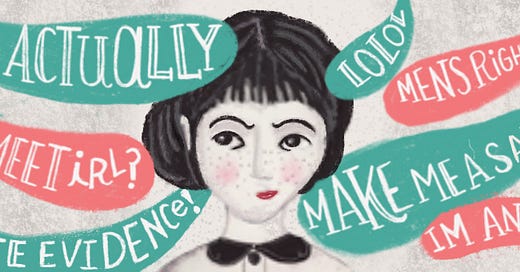In the gospel of Matthew, Jesus, that opaque storyteller, tells a parable of 10 bridesmaids who go out to meet a groom. Five bring extra oil, five do not. The groom is delayed. Eventually, the five without oil run out and ask for more from their more prepared companions. The other five refuse. And the five without oil have to rush off to buy some to relight their lamps. When they return, the bridal feast has begun, but when they knock on the door, they are not let inside. “I do not know you,” the groom says to them. The door is shut and they are left on the outside, looking in at the beautiful party.
It’s a confusing parable. One that Jesus ends with the exhortation, “Watch therefore, for you don't know the day nor the hour in which the Son of Man is coming.”
As a child in church, this parable was told as a warning against being unprepared. A warning against being lazy. It’s message, I was told, was that we ought to always behave, always act correct, and constantly watch for the return of the Lord. This made me paranoid. I believed at any moment I would be snatched up. I was anxious and afraid. I had a lot of nightmares. I was so scared of screwing up.
Eventually, I forgot about the parable. Currently, I believe we are our own apocalypse. Worlds are ending now.
But recently, my dear friend sent me a video of a short sermon by a minister I have never met at a chapel service I will never go to. “Trust me,” she said, “watch this.”
And so I did. The sermon by Dr. Cody Sanders retells the story of the bridesmaids but retells it with a slant. What if, he asks, the parable is not about preparation, but about cruelty and exclusion? Sanders tells the story of gay Christians denied communion, who go out to create their own church. He talks about marginalized people, on the outside looking in. He concludes:
So when you're inside the party celebrating how well things have gone, how great it is to finally be there after a long journey and hard work and lots of unexpected waiting, will you remember those who did not make it with you? Or will you be like the bridesmaids on the inside who neither recognized nor remembered their own friends who didn't get inside with them? Did they feel it? Did they feel the weight of forgetting? I feel it every day right now. The looming portent of amnesia, the weight of silences that we agree to keep, it makes it hard to teach and hard to ride and hard to worship and hard to sleep when we all move through our days with the weight of Israel and Gaza in our hearts, but keep it in because we hold different political perspectives and historical understandings. So we silently drag the heaviness of a multitude of corpses of around with us wherever we go.
It was a sermon I did not know I needed to hear.



